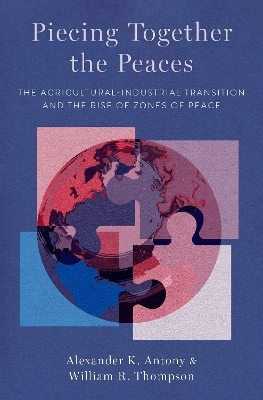
Piecing Together the Peaces
Oxford University Press Inc (Verlag)
978-0-19-778222-4 (ISBN)
In Piecing Together the Peaces, Alexander K. Antony and William R. Thompson provide a novel explanation for how peace took hold in the international system and why state behavior drastically changed. According to the standard line of reasoning, states need only democratize, liberalize their trade, modernize their economic culture, or choose to forego territorial pursuits to reach peace with another state. As Antony and Thompson argue, most, if not all, of the processes put forward as causes of modern peace are highly intertwined with the macro-process of industrialization. Marshaling a long-view perspective, they show how the introduction of mechanization into production significantly altered nearly all aspects of economic and social life, including the costs and benefits of warfare. Rather than outlining a universal pathway through which states can arrive at peace, Antony and Thompson make the case that industrialization provides the starting point from which we can begin to unpack the transformation in conflict propensities among certain states. A bold challenge to the conventional wisdom that dominates interstate peace research, Piecing Together the Peaces shows that industrialization serves as the foundation for all other factors and processes fueling interstate peace.
Alexander K. Antony is Director of Data Science and Analytics at GE Aerospace. He is also an Adjunct Professor of Business Analytics at University of Cincinnati and is a Captain in the U.S. Army Reserve. He has a PhD in Political Science from Indiana University. William R. Thompson is Distinguished Professor and Donald A. Rogers Professor of Political Science Emeritus at Indiana University Bloomington. He is also Editor-in-Chief of the Oxford Research Encyclopedia of Politics and Affiliated Professor at the University of Washington. In between two non-consecutive terms as Editor-in-Chief of International Studies Quarterly, he served as President of the International Studies Association.
Chapter 1: Introduction: Peace and Transition
Chapter 2: Warring Peaces
Chapter 3: The Main Contenders: Democratic, Interdependence, Capitalist, and Territorial Peaces
Chapter 4: Out of the Agrarian Era and into the Industrialization Era
Chapter 5: Measurement Issues
Chapter 6: A Dyadic Perspective
Chapter 7: Zones of Peace and Neighborhood Diffusion
Chapter 8: More Measurement Issues for Diffusion, Zones of Peace, and Network Effects
Chapter 9: Co-Evolution and Spatial Diffusion
Chapter 10: Zones of Peace
Chapter 11: Network Effects
Chapter 12: The Transition from the Agricultural Era to the Industrialization Era
| Erscheinungsdatum | 04.08.2024 |
|---|---|
| Verlagsort | New York |
| Sprache | englisch |
| Maße | 163 x 238 mm |
| Gewicht | 585 g |
| Themenwelt | Sozialwissenschaften ► Politik / Verwaltung ► Europäische / Internationale Politik |
| Sozialwissenschaften ► Politik / Verwaltung ► Politische Theorie | |
| Sozialwissenschaften ► Politik / Verwaltung ► Staat / Verwaltung | |
| ISBN-10 | 0-19-778222-1 / 0197782221 |
| ISBN-13 | 978-0-19-778222-4 / 9780197782224 |
| Zustand | Neuware |
| Haben Sie eine Frage zum Produkt? |
aus dem Bereich


